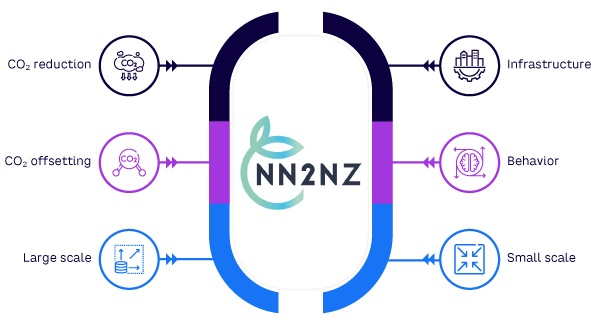North Northamptonshire, England, UK, with a population of 350,000, is a mixture of large market towns and more than 100 villages with a strategic growth plan through 2031 for 31,100 new jobs and 35,000 new homes. The aim of the NN2NZ project was to create a cost- and risk-adjusted road map for North Northamptonshire to achieve an equitable transition to net zero ahead of 2050.
The initial challenges were:
-
Determining how to create a holistic view from hundreds of data sets
-
Deciding which interventions to prioritize
-
Determining how to link intervention to impact on a data and evidence basis
-
Determining how to forecast scale and impact over time against the greenhouse gas (CO2e) gap
-
Determining how to interactively engage a diverse set of stakeholders ranging from policy makers to the general public
The digital twin incorporates data from thousands of low-carbon projects, technologies, and behavior initiatives, along with the carbon-saving impact of the interventions (see Figure 1). It might consider, for example, what if:
-
Every south-facing roof had solar
-
Every parking structure had solar and wind
-
People gave up their second cars
-
No one drove to work

solutions for reducing CO2
In this project, the role of the digital twin is to:
-
Aggregate data from diverse source for evidence-based decision-making. This includes land use, traffic data, building energy performance, social and demographic indicators, census data, and 3D data like roof shapes.
-
Analyze and simulate potential interventions to understand the trade-offs between impact and timing of interventions so that location-specific quick wins can be considered.
-
Interpret and communicate through visualizations, such as heat maps, red/amber/green (RAG)-rated infrastructure, and interactive 3D models.
-
Optimize multiple constrained objectives and give all stakeholders (planners, city councilors, developers, and the public) the ability to “optioneer” net zero futures, regardless of their analytical expertise or lack thereof.
-
Monitor and respond to the positive or negative impact of interventions in real time.
[For more on the project, see: “Accelerating the Journey to Net Zero with Digital Twins.”]




